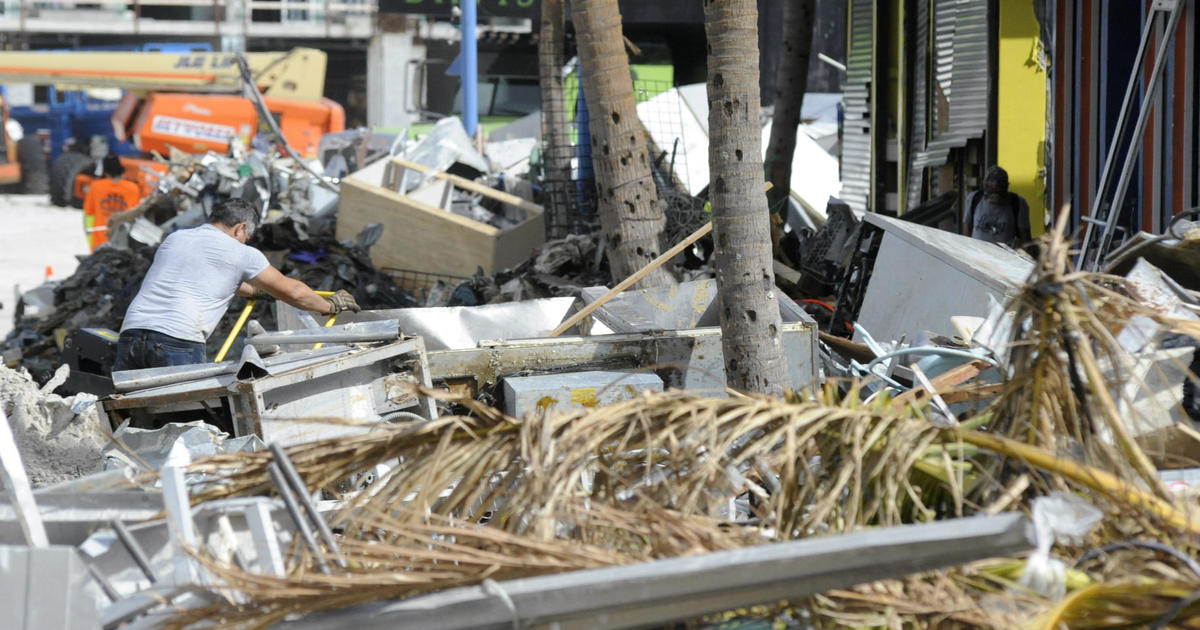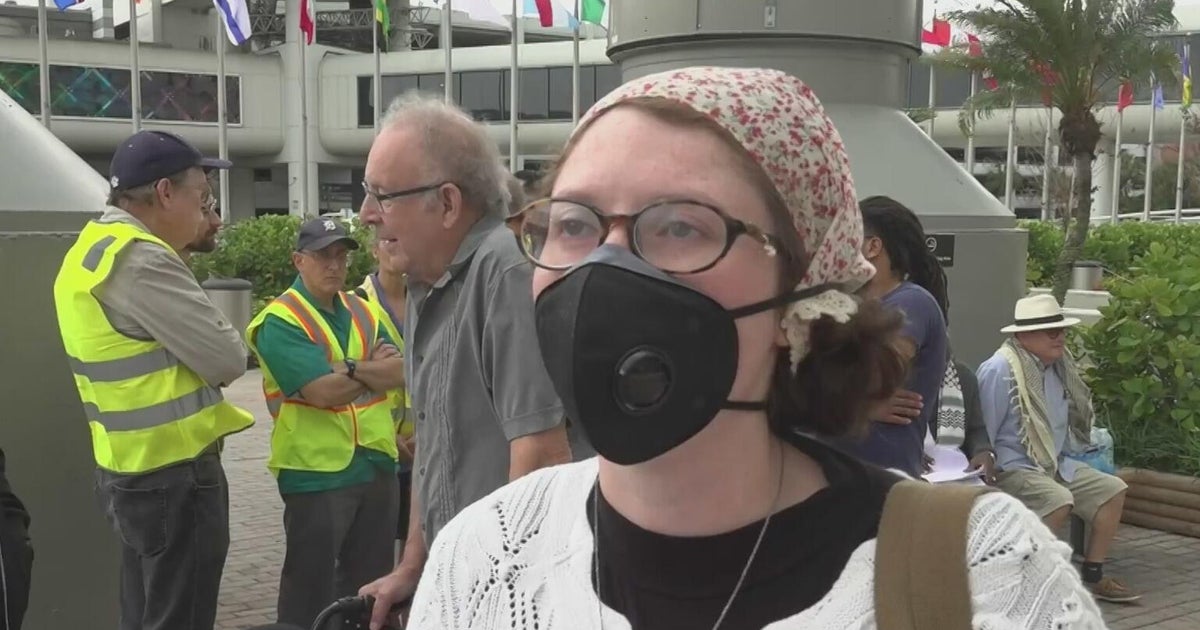MIAMI – As the west coast of Florida begins the extended process of rebuilding right after Hurricane Ian, Lee County officers are poised to award a debris elimination deal that will increase the rate for hauling debris to landfills to $40 a mile.
The existing rate: Five cents.
That single improve could price taxpayers tens of millions of bucks in added service fees, with the federal govt very likely finding up the monthly bill.
CBS News Miami has acquired email messages, textual content messages and other information which exhibit that the organization in line to be presented the agreement – CrowderGulf – has extra charges and services in other locations, as perfectly, which include the elimination of particles from private residence and waterways.
All of these modifications appear at a time when CrowderGulf has an present contract with Lee County that operates by way of Might 2023. That agreement, however, would most likely not be approximately as rewarding for CrowderGulf as the a single the Lee County Fee is completely ready to vote on Tuesday. If accepted, that new, potentially far more pricey contract would acquire influence quickly. Lee County did not right answer to questions as to why they would not implement their current deal with CrowderGulf until eventually it expired in May possibly, declaring only the county “wanted to manage continuity of operations in the course of a extended storm response.”
No single line merchandise is much more emblematic of the improve than line “A4” which raises the price to transportation debris outside the house of Lee County from five cents for each mile to $40.
Simply because of the devastating outcomes of Hurricane Ian, thousands and thousands of cubic yards of debris will have to be hauled away. By some estimates that number could be as substantially as 10 million cubic yards in Lee County by itself.
A spokeswoman for the county wrote, in response to a issue from CBS News Miami: “Estimates change substantially, as we are still in the starting of this course of action, and a great deal will rely on how substantially building and demolition particles in the long run is picked up and how considerably CPDR is authorised for reimbursement. But our recent estimates for unincorporated Lee County are closer to a person-third of your example” of 10 million cubic yards.
Because the Lee County landfill is at the moment unable to handle the particles, most of it will have to be pushed, by truck, to landfills outside the house of Lee County.
CBS Information Miami has uncovered Lee County officers are in discussions with Desoto Recycling and Disposal to just take their storm particles. “There have been some communications on that,” claimed Leonard Meyer, the supervisor of Desoto Recycling and Disposal. He reported he has been talking to Douglas Whitehead, the Strong Waste Director for Lee County.
Whitehead did not reply to cellphone messages, text messages and email messages trying to find his remark.
The DeSoto landfill is 50 miles outdoors of Lee County.
A spokeswoman for Lee County refused to say in which they will be hauling their debris, responding in an email: “The county will use many last disposal web-sites.”
Bodily hauling away particles is a single of the most time-consuming and logistically difficult sections of any hurricane cleanup and necessitates a seemingly non-halt cycle of vehicles from the devastated places to the close by landfills.
The normal truck, for occasion, only holds somewhere around 100 cubic yards of particles.
If Lee does use the landfill in DeSoto County, for each and every million cubic yards of particles hauled absent, Crowder Gulf will will need to make at the very least 10,000 visits to the landfill. At $40 a mile, for 50 miles, every million cubic yards of particles could value American taxpayers $20 million.
Less than their existing deal, where by they can only cost 5 cents a mile, CrowderGulf would only be permitted to cost taxpayers $25,000.
And that is just for mileage.
Below the proposed deal they also cost for amassing, processing and loading the particles on to the vans. They also get to cost rental expenses to the county for just about every piece of tools they use – bulldozers, cranes, and backhoes. They get individual fees for taking away refrigerators, washing equipment and dryers, as nicely as boats.
Cecil Pendergrass, the chairman of the Lee County Fee, declined to talk about the agreement and referred all inquiries to county directors.
“We are declining your interview ask for,” Betsy Clayton, the spokesperson for Lee County, wrote in an electronic mail.
In a statement to CBS News Miami, she wrote the county is transferring ahead with the CrowderGulf deal with the increased rates to “be certain the county’s contractor could bring in selection belongings to the region with aggressive subcontractor premiums.”
Clayton claimed the “collection and disposal charges in the new agreement range from 4.6% to 10.6% greater than the 2017 agreement price ranges, although inflation in the course of that interval totaled 21.8%.”
Clayton did not reply to questions as to how the added mileage expense would have an impact on the overall expense of the project, since the mileage amount was heading up by 80,000% below the new agreement.
Lee County Supervisor Roger Desjarlais did not react to e-mail looking for his remark.
In a memo issued to Lee County commissioners, Whitehead, the director of stable squander in Lee County, wrote CrowderGulf was selected following an open up bid system that started in August, in which other companies were being also evaluated and a variety committee advised Crowder prior to Hurricane Ian building landfall.
A overview of the bid documents by CBS Information Miami, having said that, reveals numerous concerns about the method. Initially, the bid seems to have downplayed the likelihood of having to haul particles outside the house of Lee County by giving that item fewer fat than other aspects. Hence, the simple fact that Crowder would demand $40 a mile did not have a important effect on their bid. By comparison, the other bidders on the agreement experienced a mileage price substantially decreased – between $15 and $21 a mile.
Also, the authentic bid did not incorporate debris removing from personal home and from waterways. Nevertheless in the agreement likely prior to the county commission, those expert services were being now additional post-Ian without the need of the chance to figure out if the costs Crowder are charging for them are appropriate or could have been performed by an additional enterprise at a reduce value.
Asked why they extra private house and waterway cleanup to the contract soon after the storm, Lee spokeswoman Clayton, wrote: “We included to the scope based mostly on the unparalleled degree of destruction in Southwest Florida and on what was seen in Michael to guarantee the county was organized for a catastrophic event this sort of as Ian with pre-negotiated charges. Owning this carried out as a standby agreement has been communicated as a most effective follow by FEMA and FDEM. That reported, we are now only buying up particles on general public legal rights-of-way or on personal streets with a recent Suitable of Entry.
It is not obvious from her reaction why the initial bid paperwork did not contain personal house and waterway cleanup or why an expedited bid method could not be used to get a far better charge for taxpayers.
The president of CrowderGulf, Ashley Ramsay-Naile, declined to be interviewed, responding in a text concept: “As you can visualize, everyone is laser-concentrated on the reaction and restoration initiatives. To ensure that information and facts is accurate and to streamline communications, all media inquiries are staying taken care of by the Lee County crew.”
Requested particularly about the $40 a-mile charge in the new contract, Ramsay-Naile did not reply.
CrowderGulf is also doing the job in other places hit by Hurricane Ian. CBS News Miami reviewed their 2017 deal with the close by town of Punta Gorda in neighboring Charlotte County. CrowderGulf is currently clearing particles in Punta Gorda and charging them a amount of roughly $11 a mile to haul particles out of Charlotte.





